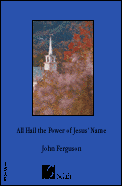|
|
 |
All Hail the Power of Jesus' Name
Composer John Ferguson
Text Edward Perronet, 1780, alt.; st. 6 John Rippon, 1787, alt.
Voicing SATB, organ, brass quartet, opt. cong.
Topics Ascension & Reign, Christ the King
Length 4' 35" Price $2.50 (U.S.) Released 5/00
Catalog no. 425-873 Difficulty Moderately difficult
Discography Fill the World with Loudest Praise, St. Paul's Chamber Choir, Robert Brewer, conductor (Selah 520-425)
Order now!
Other editions
425-874--Conductor's Score/Inst. parts--$25.00
Order the conductor's score/parts


Order downloadable PDF score/parts


Listen to this anthem in an MP3 recording
Read a history of the hymn
Download a review copy of this anthem
 Description Description
Ferguson's setting uses brass quartet, SATB choir, and creative organ registrations to enrich a congregations's singing of the well-known tune CORONATION. Solid and well-crafted, this outstanding work includes an optional ending for performance by choir alone. Ferguson's third stanza, for unaccompanied choir, is particularly striking!
Text
All hail the power of Jesus' name! Let angels prostrate fall;
bring forth the royal diadem and crown him Lord of all.
Bring forth the royal diadem and crown him Lord of all.
Ye heirs of Israe's chosen race, ye ransomed of the fall,
hail him who saves you by his grace, and crown him Lord of all.
Hail him who saves you by his grace, and crown him Lord of all.
Sinners, whose love can ne'er forget the wormwood and the gall,
go, spread your trophies at his feet, and crown him Lord of all.
Go, spread your trophies at his feet, and crown him Lord of all.
Let ev'ry kindred, ev'ry tribe on this terrestrial ball,
to him all majesty ascribe, and crown him Lord of all.
To him all majesty ascribe, and crown him Lrod of all.
Crown him, you martyrs of our God, who from his altar call:
praise him whose ways of pain ye trod, and crown him Lord of all.
Praise him who burning path you trod, and crown him Lord of all.
O that with yonder sacred throng we at his feet may fall!
We'll join the everlasting song, and crown him Lord of all,
we'll join the everlasting song, and crown him Lord of all.
--Edward Perronet, 1780, alt.; st. 6 John Rippon, 1787, alt.
History of the hymn
Edward Perronet's majestic hymn, "All Hail the Power of Jesus' Name," is among the most frequently published hymns in the United States. Since its first American appearance in two hymnals (Baptist and Universalist) in 1792, it has been included in some 2,300 American collections. It has been widely translated for use by Christians around the world.
The son of an Anglican vicar who actively supported the evangelicalism of the Wesleys, Edward Perronet worked for a time with the Methodists. His disagreements with the Wesleys over the relationship of Methodism with the Anglican Church resulted in Perronet's severing his ties to the Methodism. Misgivings about church-state relationships estranged him from the larger Church. He withdrew from the Anglican Communion and accepted the pastorate of a small Congregational church in Canterbury where he remained until his death in 1792. Throughout his life, Perronet wrote hymns, publishing them anonymously in small collections. "All Hail the Power" is the third hymn in a rare volume, Occasional Verses, Moral and Sacred. Published for the instruction and amusement of the Candidly Serious and Religious (1785). The heading over the hymn reads "On the Resurrection."
Perronet wrote "All Hail the Power" in 1779. He published (anonymously) the first stanza with a tune, MILES LANE (also anonymous), in The Gospel Magazine for November 1779. In April 1780, the same magazine reprinted the hymn with eight stanzas and another reference to MILES LANE as a suitable tune. In 1787, the Baptist John Rippon included "All Hail the Power" in his important Selections of Hymns from the Best Authors, intended to be an Appendix to Dr. Watts' Psalms and Hymns. He edited the text extensively, omitting Perronet's 2nd, 3rd and 6th stanzas and providing two new stanzas. Later renderings often omit one of Rippon's stanza's while retaining the other as the final stanza of Perronet's hymn:
O that with yonder sacred throng
We at his feet may fall!
We'll join the everlasting song,
And crown him Lord of all.
The authorship of the original hymn remained in question for nearly a century. It took less time to establish that the familiar English setting, MILES LANE, was the work of William Shrubsole, a nineteen-year-old organist and chorister in Canterbury, and Perronet's close friend. The tune most familiar to Americans is CORONATION, composed by Oliver Holden, a Boston musician, in 1793. Holden prepared this tune expressly for Perronet's words and named it CORONATION from the song's refrain "Crown Him Lord of all." Another tune often found in American hymnals is DIADEM. Composed by John Ellor (another nineteen-year-old) for a Sunday school anniversary in Droylsden, England, in 1838, Diadem often appears in hymnals that also include MILES LANE and CORONATION. "All Hail the Power" is perhaps the only hymn regularly published in American hymnals with three tunes.
|




